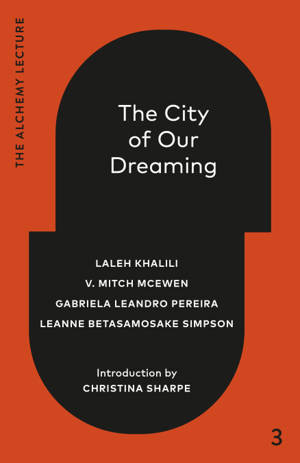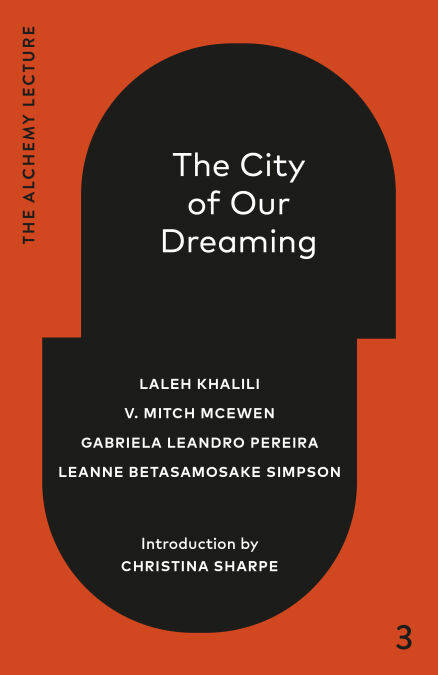
- Afhalen na 1 uur in een winkel met voorraad
- Gratis thuislevering in België vanaf € 30
- Ruim aanbod met 7 miljoen producten
- Afhalen na 1 uur in een winkel met voorraad
- Gratis thuislevering in België vanaf € 30
- Ruim aanbod met 7 miljoen producten
Zoeken
The City of Our Dreaming E-BOOK
The Alchemy Lecture 2024
Laleh Khalili, V. Mitch McEwen, Gabriela Leandro Pereira, Leanne Betasamosake Simpson
€ 24,65
+ 24 punten
Omschrijving
Four Alchemists. One book. A constellation of ideas.
The third annual Alchemy Lecture took place in October 2024 at York University to a sold-out in-person audience and online viewers from multiple continents. Four Alchemists—thinkers and practitioners working across disciplines and geographies—shared their ideas of cities and how to shape them according to community needs. Their urgent, poignant and inventive lectures have been captured and expanded in these pages.
Princeton professor of architecture V. Mitch McEwen borrows the language of the swamp to suggest a city modeled on buoyancy, inviting us to consider floating “as something other than displacement.” Iranian-American writer Laleh Khalili dreams of radical kinship, where even strangers have the means and desire to share a table, “creating [bonds] through the rituals of reciprocal giving.” In the Bantu/Kongo tradition, Brazilian architect Gabriela Leandro Pereira points to dreams as the site from which all Black emancipation begins, leading to “projects paved by the audacity to inhabit.” And Michi Saagiig Nishnaabeg writer and musician Leanne Betasamosake Simpson examines how collectives form at the thresholds between things, when one “chooses life, Black life, Palestinian life, Indigenous life, the life of the watered, aired and landed . . . over and over again, across every scale, temporality and spatiality. Relentlessly.”
These lectures are clarion calls for new conceptions of city life. Here, our Alchemists imagine the architectures and infrastructures that make possible, inevitable and irresistible gestures of freedom, modes of sustenance, and the necessity and pleasure of breaking bread, together.
The third annual Alchemy Lecture took place in October 2024 at York University to a sold-out in-person audience and online viewers from multiple continents. Four Alchemists—thinkers and practitioners working across disciplines and geographies—shared their ideas of cities and how to shape them according to community needs. Their urgent, poignant and inventive lectures have been captured and expanded in these pages.
Princeton professor of architecture V. Mitch McEwen borrows the language of the swamp to suggest a city modeled on buoyancy, inviting us to consider floating “as something other than displacement.” Iranian-American writer Laleh Khalili dreams of radical kinship, where even strangers have the means and desire to share a table, “creating [bonds] through the rituals of reciprocal giving.” In the Bantu/Kongo tradition, Brazilian architect Gabriela Leandro Pereira points to dreams as the site from which all Black emancipation begins, leading to “projects paved by the audacity to inhabit.” And Michi Saagiig Nishnaabeg writer and musician Leanne Betasamosake Simpson examines how collectives form at the thresholds between things, when one “chooses life, Black life, Palestinian life, Indigenous life, the life of the watered, aired and landed . . . over and over again, across every scale, temporality and spatiality. Relentlessly.”
These lectures are clarion calls for new conceptions of city life. Here, our Alchemists imagine the architectures and infrastructures that make possible, inevitable and irresistible gestures of freedom, modes of sustenance, and the necessity and pleasure of breaking bread, together.
Specificaties
Betrokkenen
- Auteur(s):
- Uitgeverij:
Inhoud
- Aantal bladzijden:
- 176
- Taal:
- Engels
- Reeks:
Eigenschappen
- Productcode (EAN):
- 9781039058071
- Verschijningsdatum:
- 22/09/2025
- Uitvoering:
- E-book
- Beveiligd met:
- Adobe DRM
- Formaat:
- ePub

Alleen bij Standaard Boekhandel
+ 24 punten op je klantenkaart van Standaard Boekhandel
Beoordelingen
We publiceren alleen reviews die voldoen aan de voorwaarden voor reviews. Bekijk onze voorwaarden voor reviews.







